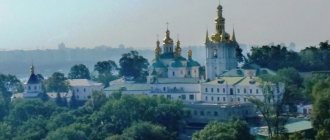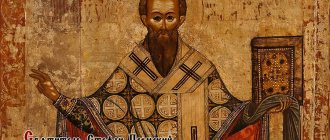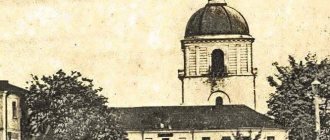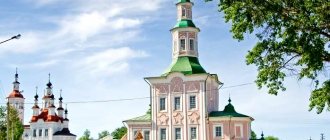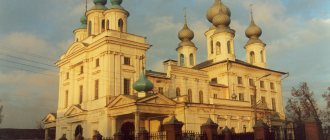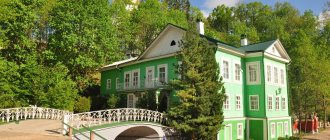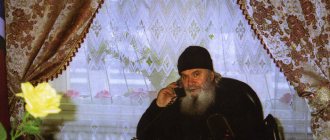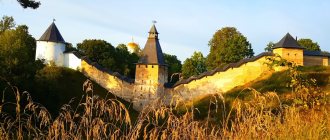Lives of the Saints
Let me know that You are God. and that there is no one else but You, so that I do not bow to the enemy’s advice.
With these words, he saw that the face of Christ on the icon was shining like the sun, and at the same time he smelled an indescribable fragrance. In horror he fell to the ground, saying:
- Forgive me, Master, that I tempted You, doubting You, my God, now I believe that You are the One God and Creator of all creation.
Lying on the ground, he turned his head and looked at the image of the Savior and saw a miracle: the image of the Lord moved its eyes and eyebrows, as if it were a living person. Niphon exclaimed:
- Blessed is my God and blessed is His glorious name now and forever, Amen!
From that time on, the grace of God descended on Niphon, for four years of his testing had already passed; after this he always had a cheerful and bright face, so that some were perplexed and said:
- What does it mean, he walked around gloomy for so many years, but now he’s happy and cheerful?
The saint showed courage against the demons, mocking them, he said:
-Where are those who claimed that there is no God? And he conquered them with constant prayer. Reflecting on his past sins, he said to himself:
“Let’s go, sinful Niphon, to church, let’s confess our sins to the Lord, the generous Father is waiting for us there.”
And he went to church. Approaching the church doors, Niphon raised his hands up and exclaimed with a bitter groan:
- Receive, Lord Jesus Christ, My God, me, dead in soul and mind, Accept a foul-mouthed sinner, defiled in soul and body, and do not turn away Your Face, do not say, Master: I don’t know who you are, but listen to the voice of my prayer and save me, for You do not want the death of sinners, and I will not leave You until You hear me and forgive my sins.
During this prayer, suddenly a strong noise was heard from heaven, and the saint was delighted to see the face of a bright man appearing in a cloud, and outstretched hands were visible with which he embraced the blessed one, like the father of the prodigal son once did (Luke 15:20), and kissed him on the neck, saying:
“You did well to come here, My grieving child!” I grieved and grieved a lot for you, as My heart burned with anticipation for you to turn to Me, whether in the evening or in the morning; now I rejoice, now I am glad, seeing that you have turned to Me with all your heart.
Niphon later told this to his student, and at the same time cried a lot. After this, while he was praying again, an angel of God appeared with a cup full of ointment, which he poured on his head, and the place was filled with a fragrance; also, when he beat his body, causing wounds to himself, an angel came down and burned incense around him, spreading fragrance in that place.
Blessed Niphon's spiritual eyes were so enlightened that he knew the secret of human hearts, he talked with angels clearly, as with friends, and clearly saw demons. One day, on the way from the church of St. Anastasia to his hut, he saw an angel in the form of a young man crying bitterly at the gate of the house of a harlot, and asked him about the reason for the tears. He answered:
“I have been given by God for the preservation of one man, who is now sleeping in this house with a harlot and thereby cruelly insults me. I cannot see the iniquity that he is doing, how can I not cry when I see into what darkness the image of God has plunged.”
The blessed one told him:
- Why don’t you punish him so that he stops sinning?
“I have no opportunity,” answered the angel, “to approach him, since since he began to sin, he has been a slave of demons, and I have no power over him: for God created man with free will and showed him a narrow the path is wide, so that he can walk whichever way he wants.
Then Saint Niphon said to his disciple:
“There is nothing more disgusting than prodigal sin, however, if a fornicator repents, then God will accept him more quickly than other lawless people, because this sin comes from nature itself, at the suggestion of the devil, and this passion is driven out by diligent prayer, strict fasting and various mortifications of the body.
The saint could also see how demons walk among the people and tempt people, instilling in them condemnation, slander, quarrels and various sorrows. One day he saw a man at work, and a demon came to him and began to whisper in his ear, another man was working nearby, a demon came and whispered in his ear, then they left work and began to quarrel. The blessed one stood up and said:
- Oh demonic temptation! How do you sow enmity between people!
One day the demon of vanity attacked him and said:
“You will now begin to perform signs, and your name will be glorified throughout the whole earth, because you have pleased God.”
The blessed one said to that demon:
- Wait, and I’ll create a sign for you.
And, finding the stone in front of him, he said:
“I’m telling you, stone, get out of here and move to another place.”
But the stone lay motionless. Then the saint said to the demon:
- This is your gift, devil!
And he spat in his face, then he prayed, and the devil immediately disappeared. Another time, Niphon saw a clergyman with a demon walking behind him, instilling in him bad and blasphemous thoughts. This man, feeling the demonic intrigues on himself, often turned around and spat at the demon. The blessed one said to the evil spirit:
- Stop, devil, embarrassing the servants of God! What good will it do you if this soul goes to destruction?
The demon answered:
“This does not benefit us, but we have an order from our king and the princes who rule over us to fight the people.” If the princes find out that we are not fighting people, they will beat us severely.
Once again the blessed one saw a monk walking and whispering a prayer, and a fiery flame flew out of his mouth and reached the sky, and his angel walked with him, with a fiery spear in his hands, with which he drove away demons from that monk. On the eve of the Feast of the Resurrection of Christ, on the evening of Holy Saturday, Niphon stood in the church with the people and saw the Most Pure Mother of God with the apostles and many saints, who came to the church and looked at the people present with maternal love. If She saw any of them caring about their salvation, she was very happy, and looking at the careless ones, she shook her head and cried, however, stretching out her hands, she prayed for everyone to God, so that everyone would receive salvation. Seeing this, the monk was indescribably glad that the Most Pure Mother of God did not abandon Christians, but constantly helped them, and She herself was a helper and protector.
One day, when Niphon was sleeping, the devil suddenly appeared with a weapon in his hand and rushed at him, with the intention of killing him, but, stopped by the power of God, he could not do anything bad to the saint and ran away, gnashing his teeth and saying:
- Oh Maria! You always drive me away from this man who is cruel to me!
The monk had the gift of instructing and comforting those in mourning with his words. One brother came to the saint in sorrow and asked:
- What should I do, father? Evil demons greatly confuse me: whether I eat, drink, or stand in prayer, they instill in my heart either heresies or grave blasphemies against my Lord Jesus Christ and His Most Pure Mother, and against holy icons, I am afraid that it will come someday fire from heaven will burn me alive.
The saint answered him:
- Take my advice, brother. When the sea is agitated, what waves it raises and breaks against the rocks; the waves return to the sea again: in the same way, evil thoughts sent by the devil act on the human soul, and if a person listens to his advice and follows it, he perishes, as many have perished, having submitted to him. If someone does not give in in the fight against bad thoughts, but takes even more courage and resists them, despising the demon, then the demon’s anger returns to him, and the person receives a reward from God. And you, child, be patient, resist the demon with prayer and fasting, and he will soon run away from you, beware of slander and anger, they most of all cause blasphemy.
So, having instructed his brother, he sent him away in peace. The monk was not deprived of the gift of healing ailments. A woman came to him with a toothache and begged the saint to heal her. He told her:
“We are sinful and nasty people, and we cannot heal you unless God Himself has mercy on you.”
And with these words Niphon went to church, prayed and, taking oil from the lamp in front of the icon of the Most Holy Theotokos, anointed the sick woman’s face all over the swelling - and immediately the pain stopped; Having been healed, the woman left, praising God. And he healed another woman, who had previously brought him food, when she became sick and was close to death, with prayer, and she became healthy. With perspicacious eyes he also saw human souls after they left the body. One day, standing in the church of St. Anastasia in prayer, he raised his eyes to heaven and saw open heaven and many angels, some of whom descended down to earth, others went up, carrying human souls to heaven. And so, he sees, two angels are going up, carrying some kind of soul. And when they approached the fornication ordeal, the demon tax collectors came out and said with anger:
“This is our soul, how dare you carry it past?”
The angels answered:
- What sign do you have on her that you consider her yours?
The demons said:
“She defiled herself to death with sins, not only natural, but even unnatural; In addition, she condemned her neighbor and died without repentance. What do you say to this?
“We don’t believe,” the angels answered, “neither you nor your father the devil, until we ask the guardian angel of this soul.”
When they asked him, he said:
- True, this soul sinned a lot, but when she got sick, she began to cry and confess her sins to God; and if God forgave her, then He knows why: He has power. Glory to His righteous judgment!
Then the angels, disgracing the demons, entered the heavenly gates with their souls.
Then the blessed one saw that the angels were carrying another soul, and the demons ran out to them and shouted:
- Why are you carrying souls without recognizing them, just as, for example, you are carrying this one - selfish, vindictive, who committed robbery!
The angels answered:
“We know well that, although she did all this, she cried and grieved, confessed her sins and gave alms; God forgave her for this.
The demons began to say:
“If this soul is already worthy of God’s mercy, then take and take sinners from all over the world!” Why are we going to work!
The angels answered this:
- All sinners who confess their sins with humility and tears will receive forgiveness by the grace of God, and those who die without repentance will be judged by God.
Thus, having shamed the evil spirits, the angels passed by. The saint also saw how they carried the soul of one God-loving man, chaste and merciful, who loved everyone; The demons, seeing her from afar, gnashed their teeth, and the angels of God came out to meet her from the heavenly gates and thus greeted that soul.
- Glory to You, Christ God, that You did not leave her in the hands of the enemy, but delivered her from the depths of hell.
After some time, blessed Niphon saw how demons were dragging the soul to hell. It was the soul of one slave, whom the master starved and beat; he could not endure such torment, and, at the instigation of the demon, he took the rope and hanged himself. His guardian angel walked in the distance and wept bitterly, and the demons rejoiced. The weeping angel was commanded by God to go to the city of Rome and protect one newborn baby who was being baptized there at that time. The monk also saw another soul carried in the air by angels, and they were met by hordes of demons; Before they even reached the fourth ordeal, the demons took that soul from the hands of the holy angels and threw it into the abyss with desecration. It was the soul of one cleric of the church of St. Eleutherius; this cleric constantly angered God with fornication, sorcery and robbery, but he died suddenly without repentance, and there was joy for the demons.
The monk built a church in Constantinople in the name of the Most Pure Mother of God, lived with her and converted many infidels to the faith of Christ. The devil could not bear the fact that Niphon distracted many from the demonic temptation, and came to him with many demons, about a thousand; they attacked the saint at night and wanted to torture him; his entire home was full of demons. He forbade them with the power of the cross and, with the help of God and the help of the holy angel, took each of them one by one, giving them a thousand blows until they swore to him not to even approach the place where the name of Niphon was pronounced.
Once talking with the brethren about spiritual benefits, Nifont remembered the following.
“There was,” he says, “in this city, a noble man’s slave, named Vasily, whose trade was a tailor, of bad character, foul language, rebellious and a buffoon; he spent all his time in games and in carnal unclean sins with adulterers and did not listen to the instructions of his master. By the wondrous Providence of the merciful Lord, he received salvation in this way: by God’s permission for human sins, a great famine occurred, and the owners began to drive away their slaves due to lack of food; His master also drove away Vasily. Vasily left and on the very first day he sold his clothes to get food for himself, then he began to walk naked and beg, and it was winter then, and he was freezing and shaking from the cold. Finally, he lay down exhausted on one street, and after a while his toes rotted away, and then his very legs. Vasily endured everything, considering it a punishment for his sins, and did not say anything except: “Thank God for everything!” So he lay for two months on the street, homeless, crying and sobbing about his sins. By chance, a lover of Christ, named Nicephorus, was walking that road. Seeing the sufferer Vasily, he ordered his slaves to take him to his house, where he lovingly calmed him down, made his bed with his own hands and fed him. Two weeks later, on Saturday, the sick Vasily began to say:
“Your arrival is joyful for me, holy angels, rest a little and let’s go.”
They also said:
- No, go quickly, for the Lord is calling you.
“Wait a little,” answered Vasily, “until I pay off the debt; I borrowed ten copper coins from one of my friends and have not paid them back until now, lest the devil would detain me for this in the air.”
And the angels waited until Vasily, having collected ten coppers, sent them to the one to whom he owed them, and then he gave up his spirit to God.
“You see, children,” Niphon finished his story, “what are the destinies of God and how, according to His desire, He saves the sinner.”
One day the blessed one came with his disciple to pray in the church, which adjoined the so-called chambers of Aponia, where the saint performed divine services, and then the saint’s spiritual eyes were opened, and he saw fire descending from heaven and covering the altar and the bishop; During the singing of the Trisagion, four angels appeared and sang along with the singers. And when they read the Apostolic Epistle, he saw the Holy Apostle Paul watching the reader from behind, and when they began to read the Gospel, the words, like lamps, rose to heaven. During the transfer of gifts, the church curtain opened and the sky opened, and a wonderful fragrance was felt, then angels began to descend down singing: “Glory to Christ God!” They brought the beautiful youth, placed him on the paten, and they themselves surrounded the throne and served the honorable gifts, while two seraphim and two cherubim, hovering over his head, covered him with their wings. When the time came for the consecration of the gifts and the performance of the terrible sacrament, one of the brightest angels came and, taking a knife, stabbed the youth, he released the blood into the holy chalice and, laying the youth on the paten, he himself stood again with reverence in his place. Then the communion of the Divine Mysteries began, and the blessed one saw that some of those receiving communion had faces as bright as the sun, while others were dark and gloomy, like the Ethiopians. The angels standing there watched whoever was approaching, and crowned those who received communion worthily, but turned away from the unworthy and abhorred them. At the end of the holy service, he saw that the youth suddenly found himself whole again - in the arms of angels, and ascended to heaven. The monk himself later told this to his disciple, who wrote it down for the benefit of many.
One day the saint, going to the Church of the Most Holy Theotokos, which he himself had built, saw that an Ethiopian was walking along the road, very sad, it was the prince of demons, and other demons were following him. When they came closer and heard church singing, the lesser demons began to scold their prince, saying:
- See how the name of Jesus is glorified by those whom we once held in our power - where is our strength? She was defeated, and our kingdom was destroyed. So the demons reviled their prince, and he said to them:
“Don’t be sad, don’t be discouraged, I will soon make it so that Christians will leave Jesus and glorify us.”
They went a little way and met thirty men; The demonic prince approached one of them and whispered in his ear, and he became confused in his mind, began to swear, laugh and sing shameless songs, then they met a musician who was walking and playing. The blessed one saw how one Ethiopian ties everyone with one rope and drags them behind the musician, and they all went dancing after him, many people stuck to them, and they went on - and danced and sang shameful songs: for the demons dragged them, hooking them heart. One rich man, watching from his house, gave the musician a copper coin to dance in front of him. When the musician put the coin in his pocket, the demons took it and sent it to hell to their father Satan and told him:
- Rejoice, our father! It was Alazion, our prince, who sent you the sacrifice that our enemies, the Christians, made, giving copper money for the games.
Taking it, Satan rejoiced and said:
- Try, children, to make our sacrifice grow, and defeat the Christians.
And then he returned the coin to the musician’s pocket. Blessed Niphon, seeing this with spiritual eyes, said with bitterness:
- Oh, woe to those who sacrifice to demons through games!
And he instructed his listeners to beware of nasty and disorderly games, since they are from the devil. One day, after prayer, the saint was in a state of spiritual delight and saw a vast field, the same length and width, and on it stood many Ethiopians, divided into regiments, all the regiments were three hundred and sixty-five - according to the number of grave sins. One of the darkest Ethiopians counted the soldiers, arranging the regiments as if for battle, and said:
- Look at me and do not be afraid of anything: my strength will be with you!
Several demons brought a variety of different weapons and distributed them among the shelves. Then the devil gave each regiment the power of magic and enchantment, and sent them throughout the whole earth to attack the Church of Christ. When blessed Niphon looked at this, suddenly he heard a voice:
- Turn, Niphon, to the east and look.
He turned around and saw a clean and beautiful-looking field, and on it, even more than the Ethiopians, stood countless numbers—hundreds of thousands—of warriors in white robes, all armed as if for battle. Then a man appeared, brighter than the sun, and said:
“This is what the Lord of hosts commands: go throughout the whole earth, help Christians and protect their lives.”
Seeing this, the monk glorified God, who helps His church.
The Monk Niphon was already approaching old age. The time has come for him to assume the priesthood, which was predicted to him by God in the next vision. He saw a field filled with a great many sheep, but they did not have a shepherd. The blessed one thought:
- Well, aren’t these sheep without a shepherd afraid of the wolf? Immediately a holy man appeared, like the holy Apostle Paul, and said:
- Why are you standing idle and looking at the royal sheep, why don’t you graze them?
Blessed Niphon answered:
- Am I going to herd the royal sheep? I am unfamiliar with this matter and quite weak.
And the one who appeared said:
“The king ordered you to shepherd them for a short time, and then, after you rest, you will receive a great reward.”
And with these words he gave him the staff, entrusted him with the sheep and the fence, and left. When he woke up, the blessed one thought: “What does this mean?” - and he realized that the husband who appeared to him was the holy Apostle Paul, the sheep were people, and the fence was the church. He was very afraid that they would make him a bishop in the reigning city. And Niphon said to himself: “Did I really beg God so that I would not rule over anyone? And now He wants to give me power! I will do as the prophet Jonah (Jonah 2) and run away from here!” Taking his student, he left his cell and boarded the ship. With a calm wind, the ship quickly reached Alexandria, where Alexander was then Patriarch8, who ruled the church after Peter, who suffered for Christ under Diocletian. On the same day, the inhabitants of the city of Constantia came from the island of Cyprus and asked Patriarch Alexander to appoint for them a bishop whom he found worthy, for their shepherd, named Christopher, a holy and venerable man, had died. The Patriarch told them:
“Wait a little while God shows me such a person.”
And that same night the patriarch saw the holy Apostle Paul, who asked him:
-Who will you appoint as bishop in the city of Constantia?
The Patriarch answered:
- I don’t know: whom God wills.
The one who appeared said:
“God will show you someone worthy, just be in church tomorrow with all the clergy and look at those entering: and whoever you see who is like me in everything, entrust him to the flock.”
The next morning the patriarch sat in the church and looked to see which of those entering would look like the one who had appeared. Niphon, not knowing anything about this, went to church and said to the disciple on the way:
“I feel some kind of sadness and joy in my heart: maybe something will happen to us!”
And with these words he entered the church. Seeing him, the patriarch said to his archdeacon:
- Look, Athanasius, doesn’t this man’s face resemble the image of the Holy Apostle Paul?
“Yes, father,” answered the archdeacon, “truly so, and he is worthy to shepherd the Church of Christ: I see that an angel of God is walking with him and talking, moreover, and a crown of precious stones is visible on his head.”
Then the patriarch called the saint, greeted him, and they sat down. The archdeacon said with a smile to Niphon:
- Why did you run away, father, now you have come to this against your will.
When the blessed one found out what would happen to him, he said with a sigh:
- Woe is me! I am a sinner and unworthy to accept such power!
The Patriarch answered:
- Oh, if only I were so unworthy!
And with these words he stood up and began the Divine Liturgy, and ordained the Monk Niphon to the rank of cleric, then within a few days ordained him a deacon and presbyter, and then elevated him to the rank of bishop, with general joy about such a shepherd revealed by God. After his appointment as a bishop, Niphon stayed in Alexandria for three days, talking with the holy men who were there. After this, the patriarch released Niphon to his throne, sending with him his archdeacon and other holy men to honor him. They arrived in the Cyprus city of Constantia on the fourth of September, the messengers, having entrusted him with the flock, returned to Alexandria, praising God. Saint Niphon of God began to diligently shepherd the flock of Christ and take care of the salvation of the believers. He was a father to orphans and widows, a free doctor to the sick and a benefactor to the weak, and at the same time he performed various miracles, which are impossible to recount all of them, for this he was very much loved and revered by everyone. Vigilantly caring for his flock, he one day saw a larger Ethiopian leaning on a staff, as if in sadness, he was walking into the city and often rested along the way. The saint realized that it was the devil and shouted to him.
“I’m telling you, you bad guy, why and how did you dare to come here?”
The Ethiopian looked at him with anger, as if he wanted to eat him, and said:
“I heard that you were here, and I came to destroy you and your sheep.”
The saint said to him:
- Weak! Are you crushed yourself and do you want to crush me? I saw how one ascetic fought with you, and thirty of your demons were exhausted in the fight against him, who wouldn’t laugh at your weakness!
“Don’t be surprised at this,” said the devil, “if I had the same strength, it would have cost me nothing to crush you, but since Jesus was crucified, I have really been weak.”
The saint answered:
“And now, if I pray to my Christ, what will happen to you, shameless one?”
“I know,” answered the devil, “that you can do a lot, but do not harm me, I will leave your city and will no longer approach it.”
Seeing this, the saint thanked God for protecting him and protecting his flock from the evil demon.
After ruling the Church of Christ for a short time, Saint Niphon approached the time of his death, which he foresaw three days in advance. Then the great Athanasius, who had previously been an archdeacon, and then, after the death of Alexander, took the throne of the Alexandrian Church, also came to him. God had announced to him in advance about the imminent death of Niphon, and therefore he came with all his clergy to say goodbye to the saint of God for the last time. Niphon, seeing Athanasius, asked him:
“Why did you bother, blessed father, to come to me, a sinful man?”
“I learned,” answered Athanasius, “that you are leaving tomorrow for the highest Jerusalem, and I came to talk with you. I ask you, when you appear before the throne of God, remember me there too, so that I too may receive mercy from the Lord.”
“And you, father,” said the saint, “when you perform divine services, remember my thinness.”
That same night Saint Niphon prayed for a long time for himself and for his flock. And an angel of the Lord appeared to him with consolation and the news that he was destined for eternal rest. During the morning singing, he began to suffer seriously from bodily illness, and therefore said to his disciple:
“Child, lay the matting on the ground for me.”
And when the student carried out his order, Niphon lay down on her completely ill. When day came, Athanasius the Great came to him and, sitting down next to him, asked:
- Father, is there any benefit to a person from illness or not?
The saint replied:
- Just as gold, when it is burned on fire, deposits rust, so a person, when sick, is cleansed of his sins.
Then, after a short silence, he began to cry, and then smiled, and his face brightened, and he said:
- Greetings, holy angels!
A little later, he said:
- Rejoice, holy martyrs! And his face brightened even more. After a while he said:
- Grace to you, blessed prophets!
Then the spiritual eyes of Saint Athanasius were opened, and he saw that the blessed one was being greeted by all the faces of the saints, each separately. Then Niphon joyfully said:
- Greetings, priests, saints and all saints! - and fell silent. Soon he exclaimed:
- Rejoice, Delighted One, my red light, my helper and strength, I glorify You, O Good One, for I remember Your mercy and grace!
After this he fell silent, and his face lit up like the sun, so that everyone present was horrified. A fragrant fragrance was also felt, and soon a voice was heard from heaven, calling him to eternal rest. So he betrayed his honest and holy soul into the hands of God on the 23rd day of December. There was weeping and bitter weeping throughout the whole city, and Saint Niphon was buried with honor in the great church of the holy apostles, glorifying the merciful to sinners, marvelous in the saints, the Father and the Son and the Holy Spirit, now and ever and unto ages of ages. Amen.
__________________________________________________________________
1 In the northern part of Asia Minor.
2 Protovestiary is one of the positions of the imperial court of Constantinople. The protovestiary had chief supervision over the royal clothing (wardrobe).
3 Here, of course, is the holy martyr Anastasia the Pattern Maker, whose memory is celebrated on December 22.
4 Wed. 1 Cor. 8:8.
5 Expression Ps. 21:1.
6 Paten (Greek - dish, plate) - a dish on which the lamb rests, i.e. that part of the prosphora which, during the liturgy, upon the invocation of the Holy Spirit, is transformed into the true body of Christ. During the proskomedia, when the lamb is removed from the prosphora and placed on the paten, the Nativity of the Lord is remembered, and the paten marks the manger in which the baby Jesus was laid. Therefore, on the paten the infant God-Man is sometimes depicted lying in a manger. But, at the same time, at the proskomedia, during the cutting of the lamb on the paten and after the transfer of gifts from the altar to the throne, the suffering of the Lord on the cross, His death, position in the tomb is remembered, and the paten marks Golgotha and the tomb of the Savior.
7 That is in Constantinople.
8 Saint Alexander was patriarch in Alexandria from 312 to 326; His memory is celebrated on May 29.
9 Saint Athanasius the Great, Patriarch of Alexandria from 326; this great saint was a zealous defender of Orthodoxy against the Arian heretics. Saint Athanasius left many works that represent an eternal monument to the indestructibility of Orthodoxy by any enemies. He died in 373. His memory is celebrated by the church on January 18 and May 2.
Source: www.vidania.ru/saints/zitiya_svyatyh_dimitriya_rosrovskogo/zitie_nifonta_kiprskogo.html
Nikolai Petrovich Fomin was born on May 7, 1885 in the village. Lipnik, Kirillovsky district, Novgorod province, in the family of the priest of the Transfiguration Lipnik Church, Kirillovsky district. From 1896 to 1900 he studied at the Kirillov Theological School. From 1900 to 1906 he received his education at the Novgorod Theological Seminary. In the Novgorod Diocesan Gazette No. 27-28 dated July 7-14, 1906, Fomin Nikolai is listed among the graduates who completed the course of the Novgorod Theological Seminary in the first category. In 1906 he entered the Moscow Theological Academy. On April 3, 1910, while studying in the fourth year of the academy, he was tonsured a monk and soon ordained a hieromonk. In the same year, he graduated from the Moscow Theological Academy with a candidate's degree in theology, and voluntarily entered the Theological School at the Solovetsky Monastery as a teacher. On July 18, 1911, he was transferred to the position of teacher of homiletics and related subjects at the Tiflis Theological Seminary. Since September 10, 1911 - teacher at the Saratov Theological Seminary. August 28, 1912 Fr. Nifont was appointed caretaker of the Petrovsky Theological School of the Saratov diocese and was elevated to the rank of archimandrite. In the summer of 1917, the future bishop’s parent died, and Fr. Nifont came to his homeland for the funeral.
Bishop of Vyaznikovsky Nifont (Fomin) in the Kazan Cathedral. Photo from the archive of Yu. A. Vasishchev
After the school was closed in 1918, he served as a priest in the village of Krasnaya Rechka in the former Saratov district.
On April 13, 1918, he was consecrated Bishop of Balashovsky
, vicar of the Saratov diocese.
In 1919 and 1921 he was subjected to repression. His appointment in 1919 as Bishop of Cherepovets, vicar of the Novgorod diocese, is not confirmed by documents. From 1919 to 1920 he lived in the village of Krasnaya Rechka, Saratov District. In February 1921, he was appointed ruling bishop of the Tsaritsyn diocese. From 1921 to 1927 he lived in Tsaritsyn (from 1925 - Stalingrad). In 1921-1923 he adhered to political neutrality. Despite this, he and his few supporters were subjected to repression. Arrested on May 12, 1922 in Tsaritsyn on charges of concealing church valuables, sentenced to 7 years in prison followed by deportation for 3 years to Kostroma. Bishop Nifont himself, in the protocol of the interrogation carried out at the OGPU PP in the Leningrad Military District on February 14, 1931, reports this on the arrest case of 1922: “He was arrested as a suspect in concealing church valuables. I was charged with the fact that allegedly, on my orders, two bowls, two d... were hidden during the seizure of valuables. and two plates, in reality I did not give any orders in this regard and I was accused of this by slander.” He was released early under an amnesty on May 7, 1924, after which he served 3 years of exile in Kostroma. From 1925 to 1927 he re-occupied the Tsaritsyn (Stalingrad) department. Bishop of Vyaznikovsky (May-September 1927)
In May 1927, His Grace Nifont was appointed Bishop of Vyaznikovsky, vicar of the Vladimir diocese.
Temporary administrator of the Vladimir diocese (May–September 1927).
From May to September 1927 he temporarily ruled the Vladimir-Suzdal diocese. After finishing his exile in Kostroma in 1927, with the permission of the authorities, he arrived in Moscow before receiving a place of ministry. From September 1927 to 1928 - Bishop of Vladivostok and Kamchatka. In June 1928 he returned to Moscow. From the middle of 1928, “he retired, after which he lived in Penza until May 1929” (from the interrogation protocol carried out at the OGPU police station in the Leningrad Military District on February 14, 1931). In 1928-1929, “without a position, he lived in the cities of Kamyshin and Penza.” In Penza he lived dependent on his friend Bishop Kirill (Sokolov). On May 26, 1929, he was appointed Bishop of Cherepovets, vicar of the Vologda diocese. In the protocol of the interrogation carried out at the OGPU police station in the Leningrad Military District on February 14, 1931, Bishop Nifont reveals this period of his life as follows: “While at rest in the mountains. Penza, received a decree from Metropolitan Sergius to depart as Bishop of Cherepovets, where he arrived on May 26, 1929. Upon arrival in Cherepovets, all on my initiative, as well as at the invitations of believers, with the permission of the authorities, I began to travel around the diocese in order to visit the parishes under my jurisdiction. So during all the trips I visited the following parishes: Stefanovskoye, Gorodishche, Vakhnovo - Cherepovets district, Chud, Shukhobod - Abakanovsky district, Kovzha, Chernoezerye, Charomskoye - Prisheksninsky district, Pustoraditsy - Kaduysky district, Petrovskoye, Rukino, N. Torzhok , Slavenka, Blagoveshchenye - N. Torzhsky district, Kirillov, village. Pokrovskoye, Goritsy, Sorov, Tsypino, Ferapontovo, Vzvoz - Kirillovsky district, Korotkoye, Petropavlovskoye, Pegenka - Petropavlovsky district, village. Munskoye - Vashkinsky district, Leushino - ... district, Belozersk, Zabolotye, N. Ozero - Belozersk district. ... In most of the parishes mentioned above, I performed bishop's services together with Archdeacon Joseph Chernyshev, who always ... traveled with me. Of course, during the services I performed, I gave religious sermons exclusively on evangelical topics, while I never said anything on political topics or expressed dissatisfaction with the Soviet government. I am loyal to the Soviet government, I obey all its laws and I am quite satisfied with my position. The sermon presented to me, which I delivered at one of the services on the topic of the evangelical youth, in which I compared the evangelical youth with modern youth selling God, I don’t remember exactly whether I said it, but of course I didn’t say the expression “selling God”, as in general such expressions I don't pronounce it. As for the commemoration of princes during divine services, I point out that similar phenomena existed and now exist; in this case, the holy princes in the litia prayer are Vladimir, Alexander, Daniel, Boris, Gleb and Igor.” Lived in Cherepovets at the address: R. Luxemburg Street, building 31, apartment 1 (this address is in the protocol of search and arrest on February 4, 1931). Apparently, simultaneously with the Cherepovets diocese, he ruled the Kirillov Vicariate, which at that time did not have its own bishop. On February 4, 1931, he was arrested by the Cherepovets sector of the OGPU in the Leningrad Military District on charges of anti-Soviet agitation. The resolution in case No. 263-31 of February 1931 states: “The authorized representative of the OGPU Emergency Situation…. Having considered the REGO case about citizens Fomina Nikol, which came to me on February 10, 1931. Petrov... and others, ... is that (indicate the content of the case) the persons involved in the case, being ministers of a religious cult, are engaged in anti-Soviet agitation, inciting religious hostility among believers and seeing the presence of signs of crimes under Art. 58-59 of the Criminal Code, which, according to Art. 91 of the Procedural Criminal Code is a sufficient basis for starting a preliminary investigation/inquiry. Decided: to proceed with the preliminary investigation/inquiry in this case, about which to inform the Cherepovets District Prosecutor.” He was kept in custody in Cherepovets Domzak. In the protocol of the interrogation carried out at the OGPU PP in the Leningrad Military District on February 14, 1931, Bishop Nifont regarding the religious situation in the country and the diocese of Fr. Convicted on October 2, 1931 by a Special Meeting of the OGPU Collegium under Art. 58-10 of the Criminal Code of the RSFSR for 3 years in concentration camps. On October 16, 1931, he was sent to serve his sentence in the Svir camps of the OGPU. Bishop Nifont is mentioned in the 1937 court case of the Belozersk clergy, in which about 100 people were shot in the Levashovskaya wasteland, mainly nuns of the Goritsky nunnery. Quote: “the investigation established that the beginning of the existence of the counter-revolutionary organization of churchmen dates back to 1930, when the governor of the Cherepovets diocese, Bishop Fomin Nifont, organized the clergy of the Belozersky and Kirillovsky districts to provide active resistance to the collectivization carried out in the village...”. Apparently, shortly after his arrest in 1932, Bishop Nifont was shot or died in custody.
Part of the memorial to the victims of political repression, on the territory of the Annunciation Convent.
Bishop’s cousin, Archpriest Alexander Fomin, who lived in the Tsypinsky churchyard of the Ferapontovsky volost, served as dean of the 3rd district of the Kirillovsky district and was sentenced to death in 1931. Korniliy (Sobolev) - Bishop of Vyaznikovsky (1921–1926). Vasily (Preobrazhensky) - Bishop of Vyaznikovsky (October 1926 - early 1927). Nikolai (Nikolsky) - Bishop of Vyaznikovsky (September 1927–04/21/1928) German (Ryashentsev) - Bishop of Vyaznikovsky (06/26–14/12/1928) Vladimir-Suzdal diocese
